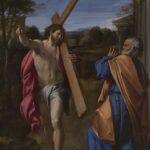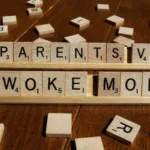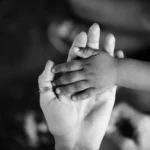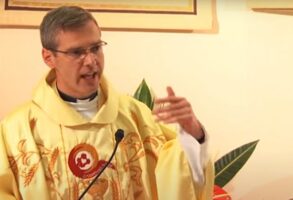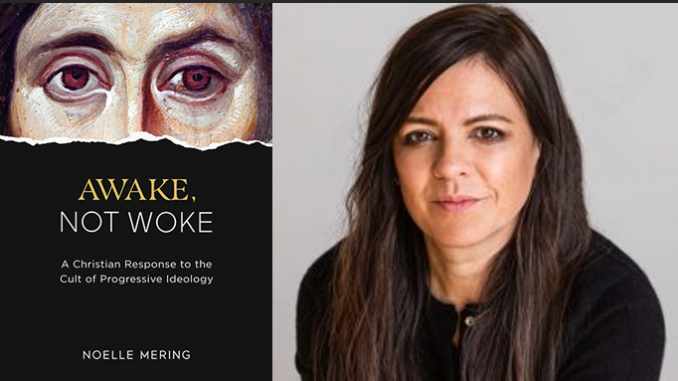
Published January 7, 2022
Editor’s Note: Noelle Mering’s new book Awake, Not Woke: A Christian Response to the Cult of Progressive Ideology (Tan Books, 2021), takes as its theme Ephesians 5:14: “Awake, O sleeper, and arise from the dead, and Christ shall give you light.” The book offers a hard look at the “woke” establishment, and at Critical Race Theory in particular: its roots, agenda, and the danger it presents to our families and society at large. Awake, Not Woke is a sober analysis of the problem. However, it doesn’t stop there: it lays out a path to restoration through faith and family.
Mering is a Fellow at Washington DC based think tank the Ethics and Public Policy Center. Her articles on culture, politics and religion have appeared in Catholic World Report, National Catholic Register, The Federalist, and other publications. She is an editor at Theology of Home and co-author of the Theology of Home book series. Mering and her husband live in Southern California with their six children.
Mering spoke recently with CWR about Awake, Not Woke.
CWR: What inspired you to write this book? Was it a response to the events of 2020?
Noelle Mering: Surprisingly no! I had been writing articles about the woke movement for a couple of years prior and signed the contract for the book about two weeks before the quarantine began and six weeks before the 2020 riots started. Writing amidst such upheaval, with the consequences of the ideology exploding across the country, gave a sense of urgency to the project. But the initial motivation was simply that it is an ideology that reduces and weakens people—especially those it claims to want to help.
CWR: Explain why it’s important for someone like me—someone ‘in the choir’ so to speak—to read your book.
Noelle Mering: I think it is important for people (of any persuasion) to see the movement with acute clarity because it operates as a bait and switch. It succeeds by manipulating good and right Christian precepts toward justice and compassion, and then positions itself as the only right application of those precepts. But the sleight of hand is that the movement rests on a whole host of unjust and nihilistic presuppositions. A large part of the battle is simply seeing through all this so that we don’t fall prey to it.
CWR: In the first part of the book you refer to Critical theory, the broader school of thought under which Critical Race Theory (CRT) falls. Why is it important to understand what Critical theory is?
Noelle Mering: Critical theory was established in the Frankfurt School by a group of German Neo-Marxists and Neo-Freudians bent on seeding a collectivist and revolutionary mindset in the West.
One of the frustrations I see happening right now is a clash between Critical Thinking and Critical theory. The goal of Critical Thinking is to arrive at the truth, whereas the purpose of Critical theory is to gain power. One side of a discussion wants to dialogue and wrestle with objections, while the other wants to dominate and silence objections. There are people of goodwill in the woke movement who likely are uncomfortable with such tactics. But the energy of the movement is driven by the more radicalized who have read the literature and know that suppression of dissenting voices is a feature, not a bug, in Critical theory.
CWR: When race became a huge topic in 2020, the absence of true dialogue about race was puzzling. This seemed to be true even in the Church. Why is this?
Noelle Mering: I think it has become such a fraught discussion that people are unsure how to do it correctly, and so they disengage. This is itself part of the triumph of the woke. The more uncertain we are of how to engage and the more wary we are of missteps, then the more prone we become to just parroting right-speak and letting the more militant among us control the conversation.
In 2020 the refrain I heard repeated time and again was, “White people need to take a seat and listen.” And the other one was, “Silence is violence.” If you put those two statements together the only real option is compelled, party-approved speech, and silence otherwise.
CWR: Interestingly, you connect abortion to Critical Race Theory. What is the link?
Noelle Mering: The woke movement identifies two types of oppression from which we must be liberated: oppressive identity groups, and the oppression of the moral law. The sexual revolution is the means by which we are liberated (via transgressive behavior) from the moral law. The twin goals of the movement are to indoctrinate a populace into a collectivist mindset as well as expressive individualism in denial of bodily meaning.
The politics of identity—race, gender, sexuality—form a sort of lens through which the world must be filtered. That lens is one of power and liberation. All institutions, interactions, and relationships are seen through this reductive filter. To reduce reality in this way requires violence: violence to truth, violence to language, and ultimately physical violence.
Abortion is a crucial example. We can somewhat cover up the wounds and emotional toll of the sexual revolution, but we can’t really cover up a baby. Unless we get rid of it.
CWR: When you spoke of the connection between abortion and Critical Race Theory, I immediately thought of the women’s marches that began in 2017. There are similarities between those marches and the race protests of 2020, aren’t there? Why are they similar?
Noelle Mering: Yes! I think this was typified when a group of pro-life feminists were prohibited from having any sort of official affiliation with the Women’s March. Many of those pro-life feminists scratched their heads thinking it should be enough that they advocate for the just treatment of women. I remember hearing such women ask, “Is this a women’s march or an abortion march?” What they did not see is that the progressive movement has fundamentally redefined womanhood in a way that centers the need for total sexual liberation.
Women’s liberation seeks liberation from men, but also from the constrictions of the body. Abortion is central to that.
CWR: As discussions of race became omnipresent in 2020, there is a different language—or doublespeak, if you will—where long familiar words no longer meant the same thing. I had already noticed this with regards to abortion; for instance, abortion is “a woman’s choice” but is no longer to be considered “elective” but essential “health care.” What is the connection between language and Critical theory?
Noelle Mering: The manipulation of language is essential to the movement. The goal is not to understand the world but to change it. Being itself is not something to be received but something to reengineer in ways that serve the desired outcome. And sadly, the result is most always new phrases that mean the exact opposite of what an unsuspecting person intends. To be an Antiracist is to embrace the discrimination against individuals based on skin color.
Ibram X. Kendi teaches that the only remedy for racial discrimination is racial discrimination. And the problem is not merely some sort of reverse discrimination. The woke antiracist movement disempowers racial minorities by teaching children that such things as politeness, punctuality, and hard work are “white” virtues. What sort of message does that give to children who aren’t white?
Because the new phrase is on the face of it true and good (albeit manipulative) there is pressure to adopt the slogans and terminology without question. It habituates us to think in shallow ways.
CWR: Why is the traditional family antithetical to the woke movement?
Noelle Mering: The family provides a person with a sort of belonging and meaning that is extremely difficult to replicate. It provides a true identity, born out of the real and robust intimacy of family life. A person is named and known. It is just that environment (provided it is a loving one) in which a person is best equipped to develop an interior life and contend with his faults in ways that dispose him to look with mercy upon the faults of others.
All of this is an obstacle to the ideology. The architects of revolution have long known that the transformation of the West had to come by way of destabilizing the familial and religious pieties of a citizenry and then exploiting the pathologies that result. Convincing people that they are defined by pain and evil is a lot simpler if they know the depths of pain and of evil personally.
Woundedness is exacerbated for the sake of making tribal loyalties more militant, and resentment calcified. The result is a people not only suspicious of the good, but trained to recoil defensively from it—while continually engaged in a futile search for a facsimile of it.
CWR: Part IV of your book is entitled “Restoration.” In it, you offer solutions to the problems posed by the woke movement. Would you say the answer is primarily spiritual?
Noelle Mering: I think it is, insofar as this is a spiritual battle far more than a political one and so must be fought first and foremost on those terms. But it also is going to need a resolute practical and political response. Finally, it is crucial to not only respond but to confidently and unapologetically promote and provide a positive vision of the good life.
CWR: Although your book is drawing a great deal of attention in general Christian circles, it would appear that your solution to the “woke problem” is not only spiritual but specifically Catholic. Why?
Noelle Mering: I tried to develop the book on three levels: the natural level (broad, knowable to human reason without reference to special revelation), a common Christian level, and then a specifically Catholic one. I hope that anyone from any persuasion can find something compelling in it, but certainly I see the truths of the Catholic Church as best able to respond to this movement.
For one, the Church has the most complete and rich understanding of the human person, bodily dignity, and sexuality on offer. Secondly, the sacramental life is a simple but profound antidote to what I see as a woke rejection of the interior life. The movement feeds off of the human temptation to deflect from our sins by constantly identifying perpetrators outside of ourselves. In Confession, in the Mass, and in daily examination, the Church makes central the need to seek out the fault in ourselves.
CWR: You end your book by talking about the City of God. You say “It’s easy to become blasé” about the “wealth and destitution” we see in our world and our church: your example is the experience of attending a Mass where the liturgy is “fine” but the priest says something vaguely heretical. Why is it important to be awake to the extremes in our world and in the Church?
Noelle Mering: It is too easy to become apathetic to the great spiritual battle at hand. I think this happens when we become purely political. To do so is to succumb to our own version of utopian ideology that tells us this world is all there is and our job here is a combination of agitating over it and catering to it. Both seem like the result of an attenuated supernatural outlook.
This can lead to us just becoming ideologues of another stripe. The best way to avoid becoming ideological is to strive to think with the full breadth of reality—both natural and supernatural. We need to see the stakes in the battle—the souls that can be lost (including our own)—but also the ineffable mercy of our Lord.
Noelle Mering is a Fellow at the Ethics and Public Policy Center where she co-directs EPPC’s Theology of Home Project. She is the author of the book Awake, Not Woke: A Christian Response to the Cult of Progressive Ideology (TAN Books, May 2021).






